|
News Blog
Latest News From Our Volunteers in Nepal
VOLUNTEER COMMUNITY CARE CLINICS IN NEPAL
Nepal remains one of the poorest countries in the world and has been plagued with political unrest and military conflict for the past decade. In 2015, a pair of major earthquakes devastated this small and fragile country.
Since 2008, the Acupuncture Relief Project has provided over 300,000 treatments to patients living in rural villages outside of Kathmandu Nepal. Our efforts include the treatment of patients living without access to modern medical care as well as people suffering from extreme poverty, substance abuse and social disfranchisement.
Common conditions include musculoskeletal pain, digestive pain, hypertension, diabetes, stroke rehabilitation, uterine prolapse, asthma, and recovery from tuberculosis treatment, typhoid fever, and surgery.
FEATURED CASE STUDIES
Rheumatoid Arthritis +

35-year-old female presents with multiple bilateral joint pain beginning 18 months previously and had received a diagnosis of…
Autism Spectrum Disorder +

20-year-old male patient presents with decreased mental capacity, which his mother states has been present since birth. He…
Spinal Trauma Sequelae with Osteoarthritis of Right Knee +
60-year-old female presents with spinal trauma sequela consisting of constant mid- to high grade pain and restricted flexion…
Chronic Vomiting +

80-year-old male presents with vomiting 20 minutes after each meal for 2 years. At the time of initial…
COMPASSION CONNECT : DOCUMENTARY SERIES

Episode 1
Rural Primary Care
In the aftermath of the 2015 Gorkha Earthquake, this episode explores the challenges of providing basic medical access for people living in rural areas.

Episode 2
Integrated Medicine
Acupuncture Relief Project tackles complicated medical cases through accurate assessment and the cooperation of both governmental and non-governmental agencies.

Episode 3
Working With The Government
Cooperation with the local government yields a unique opportunities to establish a new integrated medicine outpost in Bajra Barahi, Makawanpur, Nepal.

Episode 4
Case Management
Complicated medical cases require extraordinary effort. This episode follows 4-year-old Sushmita in her battle with tuberculosis.

Episode 5
Sober Recovery
Drug and alcohol abuse is a constant issue in both rural and urban areas of Nepal. Local customs and few treatment facilities prove difficult obstacles.

Episode 6
The Interpreters
Interpreters help make a critical connection between patients and practitioners. This episode explores the people that make our medicine possible and what it takes to do the job.

Episode 7
Future Doctors of Nepal
This episode looks at the people and the process of creating a new generation of Nepali rural health providers.

Compassion Connects
2012 Pilot Episode
In this 2011, documentary, Film-maker Tristan Stoch successfully illustrates many of the complexities of providing primary medical care in a third world environment.
From Our Blog
Godavari
- Details
Our Mission
Acupuncture Relief Project, Inc. is a volunteer-based, 501(c)3 non-profit organization (Tax ID: 26-3335265). Our mission is to provide free medical support to those affected by poverty, conflict or disaster while offering an educationally meaningful experience to influence the professional development and personal growth of compassionate medical practitioners.

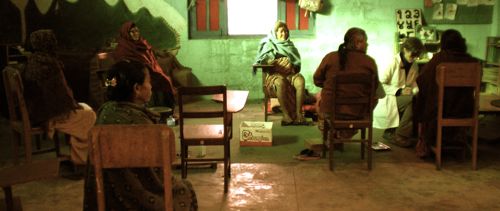
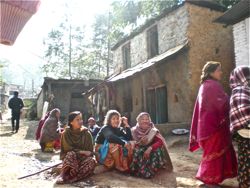 Recently I took an afternoon to interview each of our interpreters and what they told me inspired in me a new appreciation for the work we do here. I asked them, "As members of this community, how do you think this project helps?" They unanimously answered that the reason our project is so effective is because each of the practitioners takes the time to listen and treat each person with respect and kindness (evidently a quality not embraced by the medical community here in Nepal). Our interpreters had observed our practitioners patiently offering the same care and compassion regardless of whether the person was a wealthy business man or a poor farmer. To them, this is the part of our service that makes the biggest difference to the community (and here we thought it had something to do with the acupuncture).
Recently I took an afternoon to interview each of our interpreters and what they told me inspired in me a new appreciation for the work we do here. I asked them, "As members of this community, how do you think this project helps?" They unanimously answered that the reason our project is so effective is because each of the practitioners takes the time to listen and treat each person with respect and kindness (evidently a quality not embraced by the medical community here in Nepal). Our interpreters had observed our practitioners patiently offering the same care and compassion regardless of whether the person was a wealthy business man or a poor farmer. To them, this is the part of our service that makes the biggest difference to the community (and here we thought it had something to do with the acupuncture).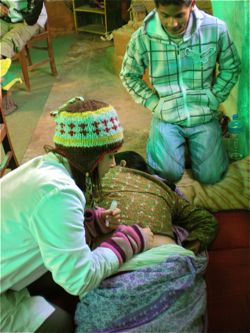 I was astounded by this simple revelation and I admit it might not be any virtue on our part because they all look pretty poor to us. But then we started treating in another village called Godavari and this revelation became even more illuminating.
I was astounded by this simple revelation and I admit it might not be any virtue on our part because they all look pretty poor to us. But then we started treating in another village called Godavari and this revelation became even more illuminating.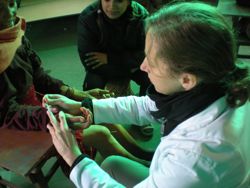 After visiting Godavari a few times we began to debate whether or not we had the resources to support this satellite clinic to a level of meaningful effectiveness. It is always a difficult choice as to how to best spend your all-too-limited resources in an arena of overwhelming need but somehow we all agreed that we needed to try. We decided that so long as we had enough volunteers, we would send two practitioners, once per week to Godavari.
After visiting Godavari a few times we began to debate whether or not we had the resources to support this satellite clinic to a level of meaningful effectiveness. It is always a difficult choice as to how to best spend your all-too-limited resources in an arena of overwhelming need but somehow we all agreed that we needed to try. We decided that so long as we had enough volunteers, we would send two practitioners, once per week to Godavari.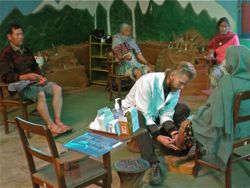 During this holiday season I hope each of you will take a few moments to think about what it means to care. How easily we get caught up in the day to day drama of our lives and forget to really see the people around us let alone treat them with respect and kindness. If we can help strangers in Nepal by listening and really seeing them... imagine what you can do with your closest friends and family.
During this holiday season I hope each of you will take a few moments to think about what it means to care. How easily we get caught up in the day to day drama of our lives and forget to really see the people around us let alone treat them with respect and kindness. If we can help strangers in Nepal by listening and really seeing them... imagine what you can do with your closest friends and family.